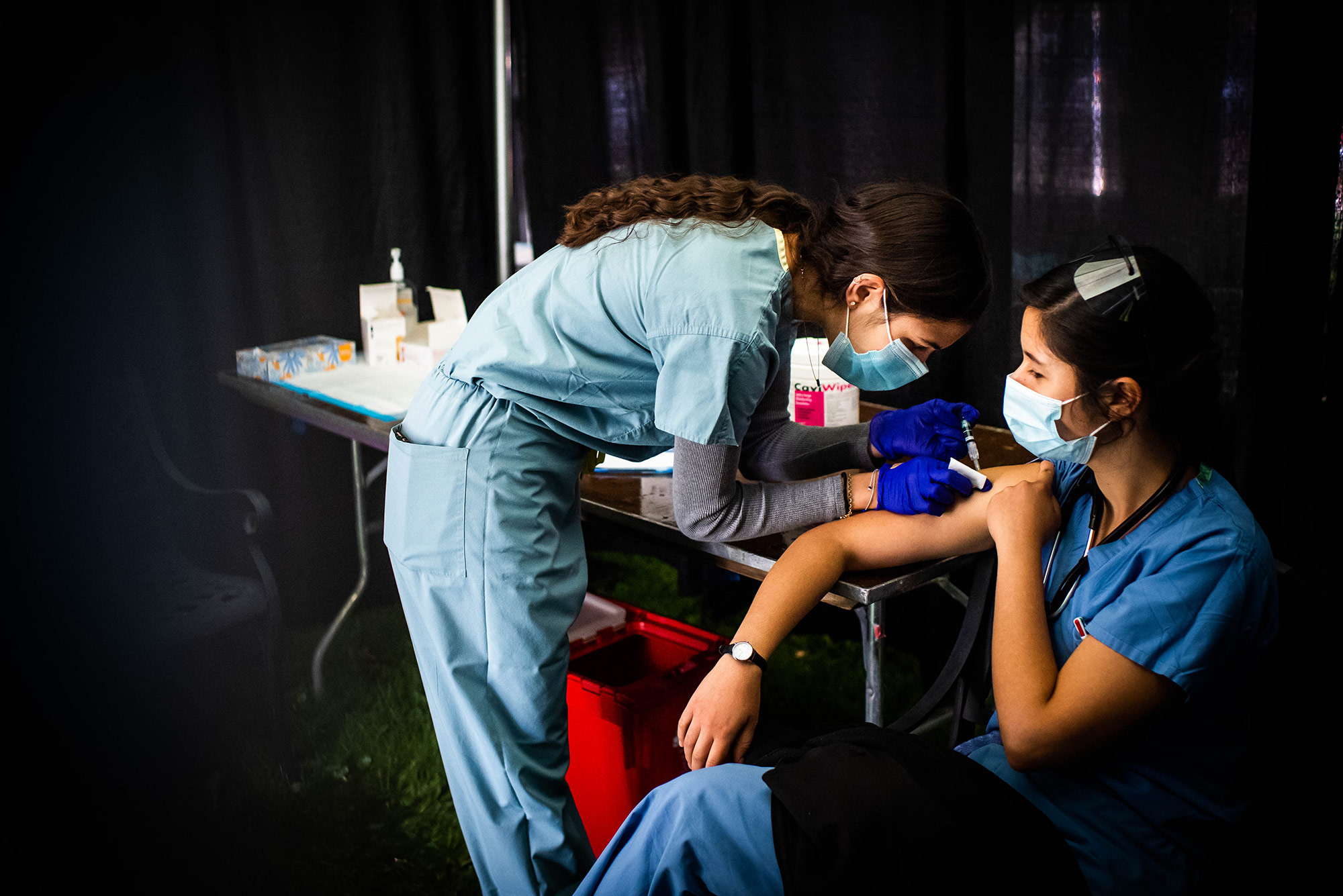Get Your Flu Shot. It’s Mandatory This Year

Renata Mukai (MED’23) getting a flu shot from Sara Khattab (MED’24) during last week’s flu clinic on the Medical Campus.
Updated: Get Your Flu Shot. It’s Mandatory This Year
Student Health Services makes it easy as clinics begin on Charles River Campus this week
Editor’s note: This story was updated on October 30 with new information.
It probably won’t take as long as reading this article. It may hurt less. And, well, you gotta.
In August, Massachusetts Governor Charlie Baker’s administration announced that students under the age of 30 must get a flu shot by the end of the year, motivated largely by concern that simultaneous flu and COVID-19 outbreaks could overwhelm the commonwealth’s healthcare system.
The vaccination is required for anyone six months or older in childcare centers, preschool, K-12 schools, and colleges and universities, unless they have a religious or medical exemption, are home-schooled, or are a higher-education student living off campus and taking remote-only classes. University students, who are full time and less than 30 years old or are in health science program, either full or part time, are required to get the flu shot. At BU, any student in a Category 1, 2, or 3 will be required to get the vaccine. If students are choosing to Learn from Anywhere (LfA) and do not plan on coming to campus at all, they are not required to get the vaccine.
“We do not have evidence that getting your flu shot reduces the chance of getting COVID-19,” says Judy Platt, director of Student Health Services (SHS). “But the symptoms of the two are similar, and we know that there are many people who get sick with the flu who can have significant consequences, particularly those with underlying medical issues, similar to COVID. We don’t want people to tax the healthcare systems with flu-related consequences when those could be prevented, and detract from the ability to handle COVID-related concerns.”
And while it may not be COVID-19, the flu is a serious illness that can disrupt the life of even a healthy young adult.
“We see students every year who get the flu and are sick for one to two weeks, and it really disrupts their academic schedule,” Platt says. “If you’re feeling really sick, it doesn’t matter if you’re learning remotely—it still affects you.”

Students living on or near campus have multiple routes to get a flu shot. The easiest is to go through the SHS Patient Connect system to make an appointment at a flu clinic.
As with most other campus activities in the COVID-19 era, students are required to show ID, wear a mask, and have a green badge on their BU Healthway app to enter a clinic. Aside from that—and requiring appointments—the clinics are essentially the same as usual. “They’ve always been fast in and out, and now, since they’re by appointment, they’re likely to be even faster,” Platt says.
It’s important to note that unless you fit under one of the aforementioned exceptions, the shots are mandatory for BU students. To ensure students comply, the University is adding the flu shot to the existing list of required vaccines. Typically, the compliance deadline is in coordination with the add/drop deadline in any given semester.
Continuing, full-time students who are under the age of 30 and are in Category 1, 2, or 3 will need to get a flu shot by January 1, 2021. If they do not, they will not be able to register classes or add/drop to their current schedule. If students are choosing to Learn from Anywhere (LfA) and do not plan on coming to campus at all, they are not required to get the vaccine.
New full-time students who are under the age of 30 as of January 1, 2021 and are in Category 1, 2, or 3 will need to get a flu shot by January 25, 2021. If they do not, they will not be able to register classes or add/drop to their current schedule. If students are choosing to Learn from Anywhere (LfA) and do not plan on coming to campus at all, they are not required to get the vaccine.
All health sciences students, regardless of whether they are full-time students or part-time students, are required to have a flu shot.
Students can also book an appointment to get a flu shot at Student Health Services, or get one at a CVS or another local pharmacy. These students will need to upload proof of a flu vaccination given outside of SHS to the Patient Connect portal so their compliance can be updated.
If you’re feeling really sick, it doesn’t matter if you’re learning remotely—it still affects you.
The price of the shot is $40, which will be billed to the Student Health Insurance Plan for those students who have it. Students covered by other health insurance plans will have the shot billed to their student account and be given a receipt they can use to seek reimbursement from their insurance company. Shots at outside pharmacies are often covered by outside insurance, as well.
There have already been flu shot clinics held on the Medical Campus, where clinical students are in many cases already required to get a flu shot as part of immunization requirements.
And although they are not covered by the governor’s mandate, faculty and staff can also get their flu shots by booking an appointment through Occupational Health. SHS and Occupational Health are working together on the clinics this year.
Platt says it’s important to emphasize that you cannot get the flu from the flu vaccine, which contains either an inactive form of the virus or a significantly weakened virus. Some people may experience mild redness or soreness at the injection site or other mild discomfort. This is temporary, is simply your immune system reacting, and will pass quickly, she says. Much quicker than a case of the flu.
It’s also important to note that the flu shot is not 100 percent effective. Different strains of the flu strike the United States each year, and the shot is based on doctors’ best guesses of which strains will be prominent. In recent years, the shot has been 30 to 60 percent effective.
“It significantly reduces the likelihood of infection, and even if you do get the flu, you are more likely to get a mild case with less serious symptoms and less likelihood of requiring an increased level of care,” Platt says.


Comments & Discussion
Boston University moderates comments to facilitate an informed, substantive, civil conversation. Abusive, profane, self-promotional, misleading, incoherent or off-topic comments will be rejected. Moderators are staffed during regular business hours (EST) and can only accept comments written in English. Statistics or facts must include a citation or a link to the citation.